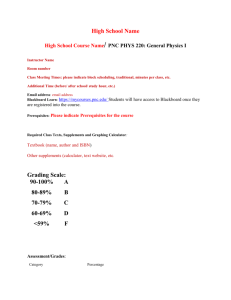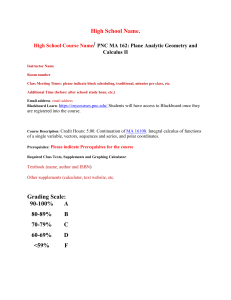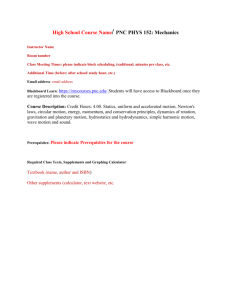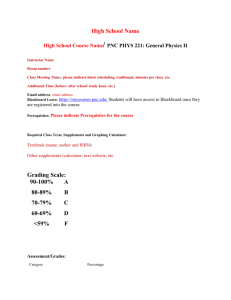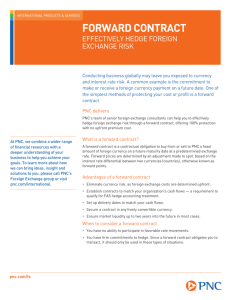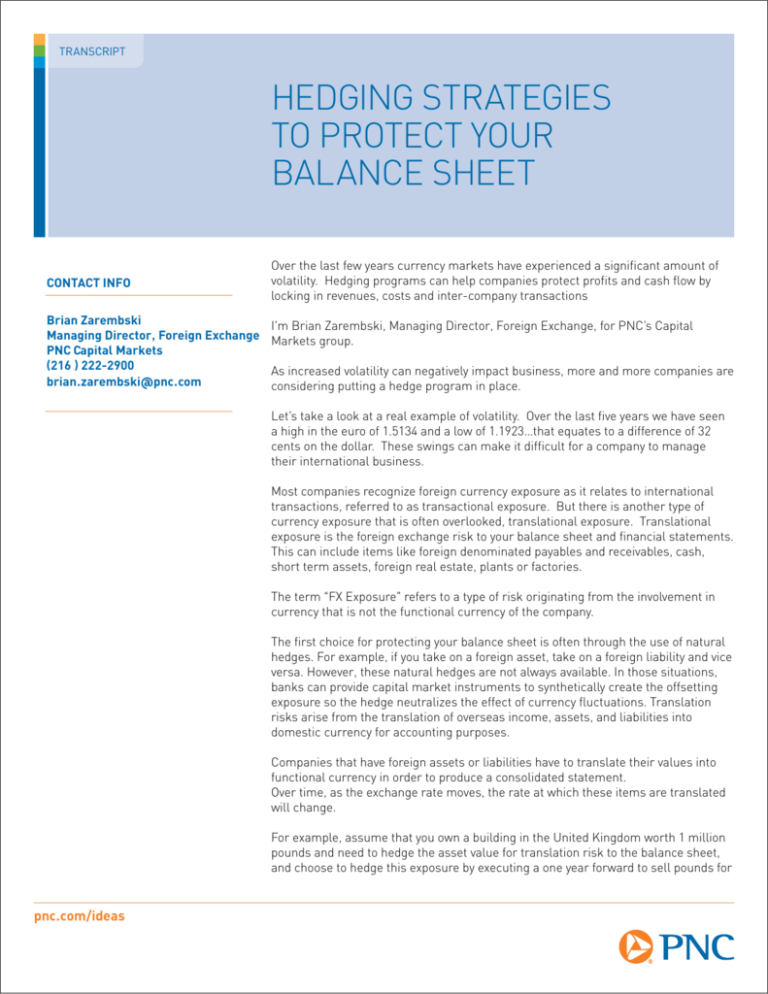
transcript
HEDGING STRATEGIES
TO PROTECT YOUR
BALANCE SHEET
Contact info
Brian Zarembski
Managing Director, Foreign Exchange
PNC Capital Markets
(216 ) 222-2900
brian.zarembski@pnc.com
Over the last few years currency markets have experienced a significant amount of
volatility. Hedging programs can help companies protect profits and cash flow by
locking in revenues, costs and inter-company transactions
I’m Brian Zarembski, Managing Director, Foreign Exchange, for PNC’s Capital
Markets group.
As increased volatility can negatively impact business, more and more companies are
considering putting a hedge program in place.
Let’s take a look at a real example of volatility. Over the last five years we have seen
a high in the euro of 1.5134 and a low of 1.1923…that equates to a difference of 32
cents on the dollar. These swings can make it difficult for a company to manage
their international business.
Most companies recognize foreign currency exposure as it relates to international
transactions, referred to as transactional exposure. But there is another type of
currency exposure that is often overlooked, translational exposure. Translational
exposure is the foreign exchange risk to your balance sheet and financial statements.
This can include items like foreign denominated payables and receivables, cash,
short term assets, foreign real estate, plants or factories.
The term “FX Exposure” refers to a type of risk originating from the involvement in
currency that is not the functional currency of the company.
The first choice for protecting your balance sheet is often through the use of natural
hedges. For example, if you take on a foreign asset, take on a foreign liability and vice
versa. However, these natural hedges are not always available. In those situations,
banks can provide capital market instruments to synthetically create the offsetting
exposure so the hedge neutralizes the effect of currency fluctuations. Translation
risks arise from the translation of overseas income, assets, and liabilities into
domestic currency for accounting purposes.
Companies that have foreign assets or liabilities have to translate their values into
functional currency in order to produce a consolidated statement.
Over time, as the exchange rate moves, the rate at which these items are translated
will change.
For example, assume that you own a building in the United Kingdom worth 1 million
pounds and need to hedge the asset value for translation risk to the balance sheet,
and choose to hedge this exposure by executing a one year forward to sell pounds for
pnc.com/ideas
dollars. As the underlying asset changes in value (up or down), the value of your
forward contract will move in the opposite direction, thereby providing an offset.
Net investment exposure involves the parent’s investment in a foreign unit, as
recorded on the parent’s books. The parent’s investment in the foreign subsidiary
is denominated in the functional currency of the sub and is equal to the U.S. dollar
value of the subsidiary’s assets less liabilities.
As an example, assume you own a factory in Europe that is valued at one million
euro. You decide to hedge this exposure and lock in the value of the U.S. dollars by
executing a one year forward contract to sell euros for dollars. As the underlying
asset changes in value (up or down), the value of your forward contract will move in
the opposite direction, thereby providing an offset.
As an alternative to entering into a forward contract, you can opt to buy a Euro
Put Option. As a result, you are 100% protected from a depreciating euro the
same way that you are protected when using a forward contract. However, if the
euro appreciates, you will be able to realize the entire gain due to the fact that you
now hold a more valuable euro asset and have no payment due to the bank. The
premium, the cost of the option, is the only cash outflow. It is paid up-front and is
the most that will ever be due.
While most companies start with hedging balance sheet exposures as they are
more visible, more are now considering hedging forecasted exposures such as
sales or expenses. Hedging anticipated cash flows depends on the company’s
ability to forecast reasonably accurately, although uncertainties can be managed by
hedging a percentage of your anticipated exposure.
This is a broad-brush overview of some of the fundamental Balance Sheet Hedging
concepts used by companies hedging certain types of foreign currency exposures.
PNC provides resources that describe and give detailed examples of these and
other aspects of balance sheet hedging. For more information, please contact your
PNC Foreign Exchange Specialist using the information on the next screen. Thank
you for your time and attention.
The materials or video that you are going to view were prepared for general information purposes only and are not intended as legal,
tax or accounting advice or as recommendations to engage in any specific transaction, including with respect to any securities of
PNC, and do not purport to be comprehensive. Under no circumstances should any information contained in those materials or
video be used or considered as an offer or a solicitation of an offer to participate in any particular transaction or strategy.
Any reliance upon any such information is solely and exclusively at your own risk. Please consult your own counsel, accountant or
other advisor regarding your specific situation. Any opinions expressed in those materials or videos are subject to change without
notice.
Investment banking and capital markets activities are conducted by PNC through its subsidiaries PNC
Bank, National Association, PNC Capital Markets LLC, and Harris Williams LLC. Services such as public
finance advisory services, securities underwriting, and securities sales and trading are provided by
PNC Capital Markets LLC. Merger and acquisition advisory and related services are provided by Harris
Williams LLC. PNC Capital Markets LLC, and Harris Williams LLC are registered broker-dealers and
members of FINRA and SIPC. Harris Williams & Co. is the trade name under which Harris Williams LLC
conducts its business.
©2014 The PNC Financial Services Group, Inc. All rights reserved
pnc.com/ideas


